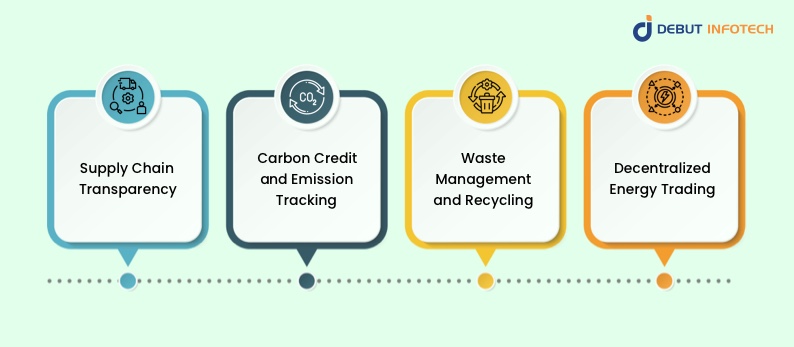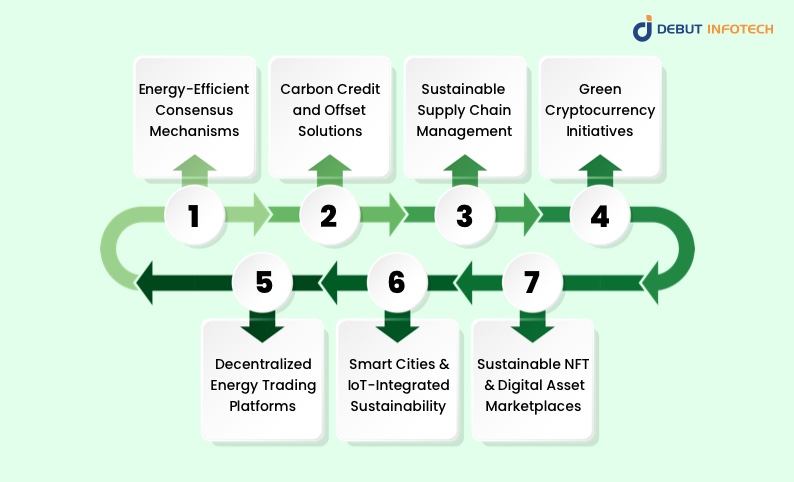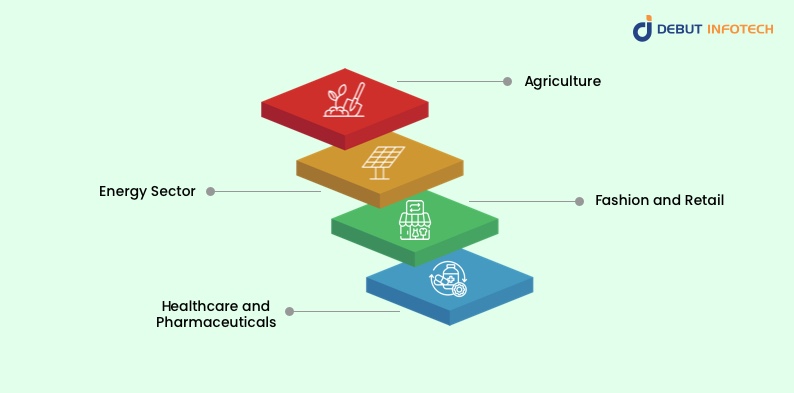Table of Contents
Home / Blog / Blockchain
Blockchain for Sustainability: How Green Solutions Are Transforming the Industry
February 7, 2025

February 7, 2025
Blockchain for sustainability is a novel concept combining environmental responsibility with the ability of decentralized technology. It offers creative ideas for increasing transparency, efficiency, and responsibility in sustainability efforts as businesses worldwide look for ways to lower their carbon footprints. Blockchain is a game changer in ethical supply chain management and carbon credit tracking, promoting a better future.
Businesses and governments have become more interested in blockchain sustainable solutions in recent years as they see how decentralized systems can help encourage eco-friendly behaviour. Growing worries about resource depletion and climate change have led businesses to use blockchain systems more and more to propel positive environmental change. This article explores blockchain’s real-world uses, problems, and future possibilities as it is changing sustainability projects.
Build a Sustainable Future with Blockchain
Our experts help optimize supply chains, cut carbon footprints, and develop sustainable blockchain applications.
The Role of Blockchain in Sustainability

Blockchain technology and sustainability have many commonalities, one of which is the need to make environmental programs as transparent and efficient as possible. Leveraging blockchain enables businesses to monitor and validate sustainable activities, therefore reducing fraud and improving corporate social responsibility. Some of blockchain’s main functions in sustainability are:
1. Supply Chain Transparency
Blockchain guarantees a totally visible operation of supply chains. By using an immutable ledger, businesses can document every phase of a product’s cycle, enabling consumers and stakeholders to check ethical sourcing, fair labour standards, and environmentally friendly manufacturing procedures.
2. Carbon Credit and Emission Tracking
Blockchain tracks emissions in an auditable, tamper-proof manner, which allows precise carbon credit accounting. This guarantees adherence to international environmental criteria and enables companies and governments to track their carbon offset initiatives.
3. Waste Management and Recycling
By offering digital tokens in return for getting rid of trash, smart contracts on blockchain platforms can encourage recycling programs. These automated solutions lower landfill overflow, track waste better, and support circular economy projects.
4. Decentralized Energy Trading
With blockchain technology, businesses and people may bypass middlemen and sell excess renewable energy directly. This helps to spread green energy effectively and pushes the acceptance of sustainable power sources.
Key Blockchain Trends Driving Sustainability
The development of blockchain trends has opened up a world of possibilities for many eco-friendly uses. These noteworthy blockchain technology trends are impacting the green economy in the following ways:
1. Green Blockchain Protocols
The high energy consumption of conventional blockchain systems, including Bitcoin, has attracted criticism. Nevertheless, emerging blockchain systems such as Ethereum 2.0, Solana, and Algorand have included energy-efficient consensus processes like Proof-of-Stake (PoS) to lower their environmental impact.
2. Tokenization of Environmental Assets
Forests, waterways, and carbon credits are just a few examples of natural resources that can be tokenized thanks to blockchain technology. This lets people and companies fund conservation initiatives using digital assets.
3. Blockchain-Powered ESG Compliance
Compliance with ESG (environmental, social, and governance) standards is gaining importance for companies. Blockchain technology helps businesses to transparently store and validate ESG-related data, therefore guaranteeing responsibility and compliance with environmental targets.
4. Smart Contracts for Green Finance
The use of smart contracts to automate sustainability-linked investments and loans simplifies green finance. These self-executing agreements simplify documentation and improve effectiveness in projects aimed at climate change.
Types of Sustainable Blockchain Solutions

Many sustainable blockchain solutions have been emerging as blockchain technology develops to lower environmental impact while yet preserving security and efficiency. These ideas center on lowering energy use, improving transparency, and advancing environmentally friendly industry practices across the board. Here are a few important types of long-term blockchain solutions:
1. Energy-Efficient Consensus Mechanisms
The Proof-of-Work (PoW) consensus techniques used by Bitcoin and other traditional blockchain networks use a lot of power. Newer blockchain systems are implementing energy-efficient substitutes to handle this:
- Proof-of-Stake (PoS): In Proof-of-Stake (PoS), miners don’t have to solve hard math problems like they do in Proof-of-Work (PoW). Rather, validators are chosen in line with token count and willingness to “stake,” therefore drastically lowering energy use. Two instances of PoS application are Ethereum’s switch to Ethereum 2.0 and Cardano’s blockchain network.
- Delegated Proof-of-Stake (DPoS): By allowing token holders to vote for a small number of trusted validators, this form of PoS lets transaction processing speed and power consumption be at the lowest.
- Proof-of-Authority (PoA): This methodology guarantees excellent efficiency and minimal energy usage by utilizing a small number of trustworthy validators to confirm transactions.
2. Carbon Credit and Offset Solutions
Carbon credit trading relies heavily on blockchain technology, which provides immutable and transparent records of carbon offset projects. Tokenized carbon credits—which lower carbon emissions—can be purchased by businesses and people to balance their environmental impact. Blockchain guarantees verified credits, thereby stopping duplicate counting and fraud. Leading ideas in this field come from sites like KlimaDAO and Toucan Protocol.
3. Sustainable Supply Chain Management
Blockchain helps companies trace and confirm sustainable raw material procurement, improving supply chain transparency. Blockchain guarantees that ethical and environmentally acceptable methods are followed by capturing every stage of the manufacturing and distribution process.
- Luxury firms, for example, employ blockchain to verify the ethical procurement of gold and diamonds.
- Blockchain is applied by the food sector to confirm fair-trade policies and organic certificates.
- Blockchain is used by renewable energy providers to track the sources of sustainable energy.
4. Green Cryptocurrency Initiatives
Green cryptocurrencies are under development as the environmental effects of bitcoin mining raise increasing questions. These digital coins depend on sustainable consensus systems and prioritize low-energy transactions. Here are some well-known green cryptocurrencies:
- Chia (XCH): Uses a “Proof-of-Space and Time” mechanism, which relies on unused storage space rather than high-power computation.
- Nano (XNO): To eliminate mining and greatly lower energy consumption, nano (XNO) uses a block-lattice structure with an Open Representative Voting (ORV) mechanism.
5. Decentralized Energy Trading Platforms
Businesses and individuals may now buy and sell extra renewable energy thanks to blockchain technology, which enables peer-to-peer (P2P) energy trading. By removing middlemen, blockchain improves efficiency, lowers prices, and promotes acceptance of renewable energy. It is used on sites like Power Ledger and Grid+ to build decentralized, environmentally friendly energy marketplaces.
6. Smart Cities and IoT-Integrated Sustainability
The integration of blockchain technology with the Internet of Things (IoT) is enabling the development of smart cities that minimize resource consumption. One way blockchain is helping is by collecting data in real-time and automating smart contracts. This allows companies to:
- Reduce water and electricity waste.
- Track air quality and pollution levels.
- Optimize waste management systems.
7. Sustainable NFT and Digital Asset Marketplaces
Some have voiced concern about the energy usage of NFT marketplaces, especially on PoW blockchains. Eco-friendly NFT platforms use PoS, or Layer 2 scaling techniques, to reduce carbon footprints. Several NFT markets promise carbon neutrality today by funding offsetting emissions and renewable energy projects.
Implementing these sustainable blockchain solutions would help companies and developers use blockchain technology and simultaneously preserve the environment. Blockchain’s ongoing development for sustainability shows how the coexistence of digital innovation and environmental sensitivity is possible.
Benefits of Sustainable Blockchain
Blockchain technology, combined with sustainability initiatives, has a lot of advantages; hence, it is an essential tool for companies that aim to take on environmental responsibility. In addition to lowering carbon footprints, sustainable blockchain solutions improve openness, efficiency, and economy of cost. Here are several main benefits:
1. Reduced Energy Consumption
Power consumption is a major issue for older blockchain networks, especially those that rely on Proof-of-Work (PoW) algorithms. While preserving security and decentralization, sustainable blockchain solutions, including Proof-of-Stake (PoS) and other energy-efficient consensus techniques, substantially cut power use. Because of this, blockchain technology is now more sustainable and suitable for broad use.
2. Enhanced Transparency and Trust
Blockchain technology guarantees that all transactions are logged permanently and can be verified thanks to its immutable ledger. Industries such as supply chain management, where companies have to demonstrate ethical sourcing, fair labor standards, and environmental compliance, depend on this transparency. Blockchain allows companies to monitor and audit environmentally friendly policies readily, hence building confidence among stakeholders and customers.
3. Improved Carbon Credit Trading
Sustainable blockchain systems tokenize carbon credits on a decentralized database, which facilitates their exchange. This lessens duplicate counting, fraud, and inefficiencies sometimes present in conventional carbon markets. Blockchain technology allows businesses to keep tabs on their carbon footprint and contribute to global sustainability efforts with concrete evidence of their impact.
4. Efficient Supply Chain Management
Blockchain verifies the environmental impact of products and offers real-time tracking of items, improving supply chain sustainability. Companies can:
- Ensure that raw materials are ethically sourced.
- Track emissions throughout the manufacturing and distribution process.
- Optimizing logistics and inventories to lower waste.
With this much transparency, companies can meet their sustainability goals and attract customers who care about the environment.
5. Decentralized and Fair Energy Distribution
Without depending on centralized energy providers, individuals and businesses can purchase and sell renewable energy through peer-to-peer (P2P) energy trading, made possible by blockchain technology. Solar, wind, and other sustainable energy sources are more likely to be used when the system is decentralized, making energy use more efficient and cost-effective. Smart grids driven by blockchain also lower reliance on fossil fuels and maximize energy distribution.
6. Lower Operational Costs
Blockchain technology lowers costs for companies implementing sustainable practices by removing middlemen and simplifying transactions. By automating tasks such as supply chain tracking, regulatory compliance, and payments, smart contracts lower administrative expenses and raise general efficiency.
Real-World Applications of Blockchain for Sustainability

Blockchain sustainable solutions are being included in many different sectors to reduce their environmental effect. Among the important industries gaining from blockchain for sustainability are:
Agriculture
Blockchain systems track agricultural supply chains, guarantee fair trade, help lower food waste, and support sustainable farming methods. They also help companies like IBM Food Trust increase food industry traceability.
Energy Sector
Companies in the energy sector are using blockchain technology to create decentralized energy networks. These networks allow for transparent renewable energy certifications and peer-to-peer energy trade. Platforms such as Power Ledger and WePower make blockchain-based energy trading possible.
Fashion and Retail
Blockchain is used by luxury businesses and fashion stores to confirm ethical procurement and cut fake goods. Consumers can scan QR codes to check products’ sustainability credentials and authenticity.
Healthcare and Pharmaceuticals
Blockchain tracks the source of raw materials, lowers waste, and guarantees responsible disposal of outdated medications, therefore guaranteeing that medical supply chains follow ethical and environmental rules.
Challenges and Limitations
Blockchain for sustainability has various difficulties despite its potential that could prevent its general acceptance:
Energy Consumption
Although more recent blockchain systems prioritize energy efficiency, conventional systems like Bitcoin still require a lot of electricity. Work is underway to switch to more sustainable consensus systems.
Regulatory Hurdles
The absence of explicit rules may slow the adoption of blockchain-based sustainability initiatives. Governments should create systems that encourage the sensible application of blockchain in environmental projects.
Scalability Issues
Constraints on scalability in blockchain systems will influence transaction efficiency and speed. Sharding and Layer 2 solutions are among the advances meant to increase blockchain scalability for sustainability uses.
The Role of Blockchain Consultants and Development Companies
The necessity of professional advice has grown as more companies investigate sustainable solutions to blockchain. Blockchain consultants assist companies in implementing tailored blockchain plans that complement sustainability and blockchain objectives. Green blockchain solutions designed to meet the demands of particular industries are also within the technical capabilities of a blockchain development company.
Leading blockchain development firms concentrate on building environmentally friendly blockchain systems that maximize productivity while lowering their environmental impact. Their knowledge guarantees long-term sustainability benefits by enabling companies to easily incorporate blockchain solutions.
The Future of Blockchain in Sustainability
Though its future is yet unknown, blockchain for sustainability certainly looks promising. Blockchain systems will grow more scalable, energy-efficient, and easily available for general acceptance in sustainability projects as technology develops. Future developments influencing blockchain’s position in sustainability consist:
- Increased Adoption of Green Blockchains: More projects will transition to energy-efficient blockchain protocols, reducing overall environmental impact.
- Integration with IoT and AI: Combining blockchain with the Internet of Things (IoT) and Artificial Intelligence (AI) will enhance real-time monitoring of sustainability metrics.
- Greater Corporate Responsibility: Companies will be under increased pressure to adopt blockchain-powered sustainability measures to meet ESG requirements and consumer expectations.
- Enhanced Collaboration Between Governments and Enterprises: Governments will work with businesses to create regulatory frameworks that promote blockchain for sustainability initiatives.
Leverage Blockchain for a Sustainable Future
Our expert blockchain development services help to innovate, optimize, and elevate your green initiatives with secure and transparent solutions.
Conclusion
Blockchain for sustainability is a transforming power that might completely change sectors and support environmental responsibility. Blockchain sustainable solutions let companies improve their environmental projects’ accountability, transparency, and efficiency. Despite ongoing obstacles, a more environmentally friendly and sustainable future can be achieved through the combined efforts of blockchain development businesses, policymakers, and consultants.
Companies that adopt blockchain technology will lead the sustainability revolution as blockchain trends change, hence influencing a world in which environmental responsibility coexists with blockchain use.
Frequently Asked Questions
Blockchain technology enhances environmental sustainability by providing a decentralized, transparent ledger system for tracking sustainable practices across industries. It ensures the authenticity of eco-friendly products, automates environmental regulations, promotes renewable energy use in energy trading, and supports carbon credit systems by providing a transparent platform for tracking emissions and offsets, encouraging organizations to reduce their carbon footprint.
Blockchain technology, while promising for sustainability, raises environmental concerns due to its high energy consumption. Traditional networks like Bitcoin use computational power, causing carbon emissions. However, the industry is shifting towards energy-efficient consensus mechanisms like Proof-of-Stake and sustainability-focused blockchains, which aim to integrate eco-friendly practices into operations to mitigate these issues.
Blockchain platforms are transitioning from energy-intensive PoW consensus mechanisms to sustainable alternatives like PoS and Delegated Proof-of-Stake (DPoS), reducing their environmental impact. Ethereum is upgrading to implement PoS, while new platforms focus on energy efficiency and lower carbon footprints. This reflects the growing recognition within the blockchain community of the need to balance technological advancement with environmental responsibility.
Blockchain can significantly promote renewable energy adoption by enabling decentralized energy markets, allowing consumers to trade energy directly, and facilitating peer-to-peer platforms for solar panel sales. It can also streamline the certification and tracking of renewable energy credits, ensuring authenticity and preventing double-counting, thus accelerating the integration of renewable energy into the grid and supporting global sustainability goals.
Blockchain consultants and development companies are crucial in promoting sustainable blockchain solutions. They assist organizations in designing and implementing systems that prioritize energy efficiency and environmental responsibility. They guide the selection of consensus mechanisms, optimize smart contract code, and integrate blockchain with other technologies. They also develop applications for environmental initiatives like supply chain transparency and renewable energy trading.
Blockchain technology focuses on sustainability through energy-efficient consensus mechanisms, real-time environmental monitoring, transparent supply chain management, and carbon offset markets. This reflects a broader industry commitment to reducing environmental impact and promoting sustainable practices through technological innovation, demonstrating the potential of blockchain in achieving these goals.
Blockchain improves transparency and accountability in sustainable practices by providing an immutable, decentralized ledger of transactions and data. It fosters trust among stakeholders, tracks products from origin to consumer, and records data on resource usage, emissions, and conservation efforts. This transparency holds organizations accountable for their environmental impact and encourages adherence to sustainability commitments.
Talk With Our Expert
Our Latest Insights
USA
2102 Linden LN, Palatine, IL 60067
+1-703-537-5009
[email protected]
UK
Debut Infotech Pvt Ltd
7 Pound Close, Yarnton, Oxfordshire, OX51QG
+44-770-304-0079
[email protected]
Canada
Debut Infotech Pvt Ltd
326 Parkvale Drive, Kitchener, ON N2R1Y7
+1-703-537-5009
[email protected]
INDIA
Debut Infotech Pvt Ltd
C-204, Ground floor, Industrial Area Phase 8B, Mohali, PB 160055
9888402396
[email protected]




Leave a Comment